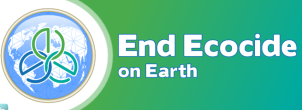
By Nick Meynen. Around 100 scientists, lawmakers, jurists and activists gathered in Brussels on 13 October 2014 for an End Ecocide on Earth conference. Eco-cide derives from the Greek “oikos” meaning “house” or “home” and the Latin “caedere” meaning “strike down, demolish, kill”. It literally translates to killing our home. Ecocide is the destruction of our natural environment. Defined as the extensive damage to, destruction of or loss of ecosystems of a given territory it covers all major environmental disasters. The aims of the End Ecocide and EJOLT networks are the same: raising awareness and working towards bringing an end to these environmental injustices. An important part of the solution is through legal means.
Here’s a brief overview of this very interesting day – as it happened:
Professor Damien Short gave a short history of ecocide – a term first coined in the 1970s. He researched who campaigned against it and how it was removed from the table. Appalingly, this often depended on a decision by 1 person, such as the chair of a drafting committee. One explanation could be that in the eighties, when the concept was digged a second time, the world was still in a nuclear arms race and the impact of a law on ecocide would sure have had an impact on that process. Damien: “You cannot divorce politics and political processes from law making.” To illustrate how relevant that is today Damien showed a very interesting and well-researched organigram of the relations between corporations and lawmakers in the UK.
Prof. Laurent Neyret explained the nuances of different definitions of ecocide with for example the difference between ecocrime (security for the environement) and ecocide (security for the globe). According to him, waste, trafficking species, pesticides use could all come under the ecocide banner.
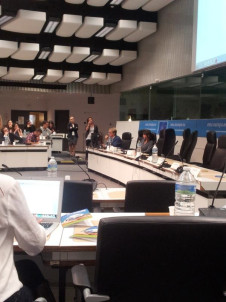 We then presented the Atlas of Environmental Justice and put a figure to the often repeated truth that cultural diversity is in danger due to environmental crime and that indigenous people suffer the most. As our atlas shows: while they are 4% of the world population, they are involved in 46% of all environmental conflicts mapped. We debunked the myth that we first need to get rich to save the environment, with an example of how poor people got rich by fixing the environment. But we also explained how many villages don’t get that chance due to environmental crimes destroying the fundamental basis to life a good life on: earth. We mentionned villages in the Niger delta, destroyed by Shell and villages in California, destroyed by fracking. And of course, we presented the atlas and the value it has in this effort to recognise ecocide as a crime. The test version of a featured map on ecocide was well received and we made several new promising connections to improve the atlas further.
We then presented the Atlas of Environmental Justice and put a figure to the often repeated truth that cultural diversity is in danger due to environmental crime and that indigenous people suffer the most. As our atlas shows: while they are 4% of the world population, they are involved in 46% of all environmental conflicts mapped. We debunked the myth that we first need to get rich to save the environment, with an example of how poor people got rich by fixing the environment. But we also explained how many villages don’t get that chance due to environmental crimes destroying the fundamental basis to life a good life on: earth. We mentionned villages in the Niger delta, destroyed by Shell and villages in California, destroyed by fracking. And of course, we presented the atlas and the value it has in this effort to recognise ecocide as a crime. The test version of a featured map on ecocide was well received and we made several new promising connections to improve the atlas further.
Then there was a panel on Human Rights with a former judge, a scientist, an activist and a former ombudsman for future generations. Ex-Judge Marie-Odile Bertella-Geffroy spoke about the difficulty of implementation of the current laws in cases of environmental injustice but also mentionned a case where people have gone to jail in Italy for environmental crimes. She added: “We are not talking just about few animals or birds, but loss of many human lives”
Prof Dominique Belpomme, a physical doctor, talked on the Paris appeal: the International Declaration on diseases due to chemical pollution. The appeal says three very important things in it’s first three articles. Art 1: The development of numerous current diseases is a result of the deterioration of the environment. Art 2: Chemical pollution represents a serious threat to children and to Man’s survival. Art 3: As our own health that of our children and future generations, is under threat, the Human race itself is in serious danger.
This appeal was signed by 1000s of scientists, 10 Nobel Peace Prizes in medicine, 1500 NGOs, 350.000 citizens and the Standing Committe of European Doctors representing 2 million doctors in the EU. It’s clear from this that doctors are in favor of a global legal framework that confronts the issues with chemical pollution and Prof Dominique Belpomme was here to express support to do that in the context of a law on Ecocide.
Gert-Peter Bruch from Planète Amazone talked on Ecocide, indigenous rights and the UN declaration on the rights of indigenous peoples. According to indigenous peoples, white men are doing some kind of “planned obsolescence” on a planetary scale. Indigenous people link us to the invisible element that connects us to this earth – something have all too often forgotten. Bruch concluded by saying that “We have to work together and find efficient ways to use ecocide, also as cultural ecocide.”
Sandor Fülop, former Ombudsman for future generations in Hungary quoted the Ban ki-Moon report that says: “we all have human rights and it cannot depend on the time of our birth date.” He also referred to the New Jersey Environmental Chief Prosecutor: in 90% of their work they used criminal law measures. The Hungarian Ombudsperson for future generations (2008-2012) used 90% administrative law and 10% civil law measures. “Too bad we were not in a position to use criminal law.”
Jan van de Venis briefly introduced the new organisation Grrrowd. Through Grrrowd, people without money will get access to environmental justice. There’s doing crowdfunding for paying lawyers to do a legal case on any environmental justice.
In the afternoon there was a panel on Shifting the global economy in a sustainable context. Dr. James Skelly, Director of the Baker Institute for Peace and Conflict Studies, talks on species conciousness. He quoted James Lovelock who said that this time looks very much like 1938 or 1939. because then also “we all new something terrible was about to happen but didn’t know what to do about it.”
Roger Cox, a lawyer and author of Revolution Justified, talked on Ecocide in the face of a changing climate. “On behalf of 900 citizens and 1 NGO we opened a climate lawsuit: we charged the Dutch government last year. Because of abscence of action of climate change the government is commiting a violation of the duty to care and the right to live and the right to family life.” While ecocide focusses on int criminal law, the Dutch case focusses on national tort law. “We hope to create a ripple effect: if we get our government convincted, others will follow.”
Wouter Veening, President of the Institute for Environmental Security talked on Ecocide and environmental security. He gave the example of the Indus river, where climate change is adding to the already increasing competition over it’s waters. “We are really concerned about climate change having such an impact on the Indus that it becomes a serious security issue”. While the upper part of the Indus is in India, it is also the lifeline of Pakistan.
Anne van Schaik from Friends of the Earth Europe talked on ecocide and responsible investment – with a focus on landgrabbing. “Landgrabbing happens because of a high demand on land for extraction, tourism, dam projects and timber, due to EU biofuel policies, as a good investment and so on. Most of all: land is grabbed because it is possible to grab it.” According to the World Bank there is still ’empty land’ available, but people live on it. Anne gave the example of palm oil company Wilmar. “Just by campaigning you can get a situation to a certain level – but you need a law on ecocide to make an actual change on the ground.” She ended with pointing to some windows of opportunity to get binding regulation on regulating financers – not by introducing new legislation but by looking at upcoming legislation, for example on pension funds.
At the conference, ecocide, genocide, human rights, indigenous peoples, fracking and climate change are connected by most speakers. Many promising practices were shared and the seeds of new collaborations were made in the corridors. It’s great to see that this campaign is already covered in some mainstream media. More information on the campaign – which is run for 100% by a huge team of incredible volunteers – is here.

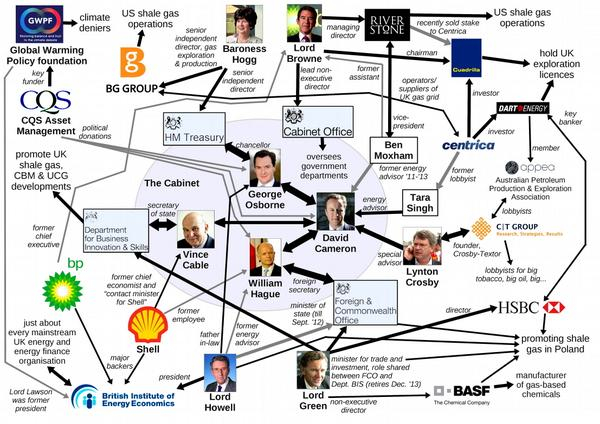
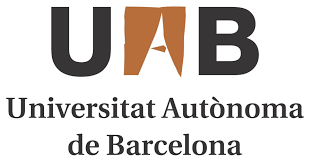


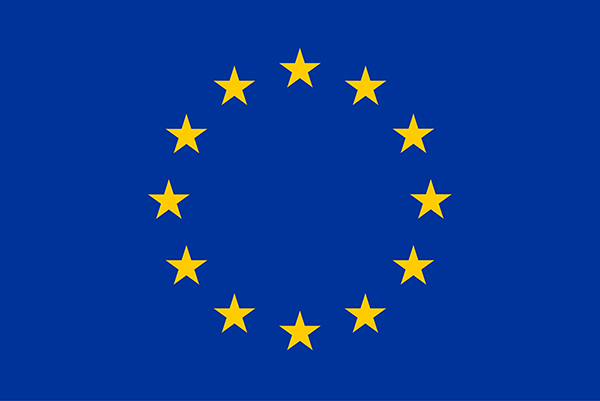
STOP !!!!!!!